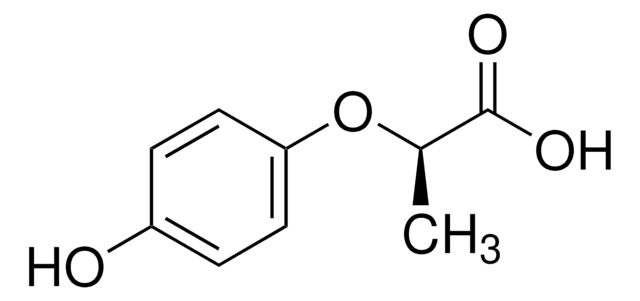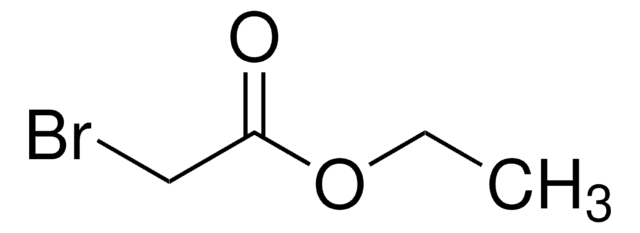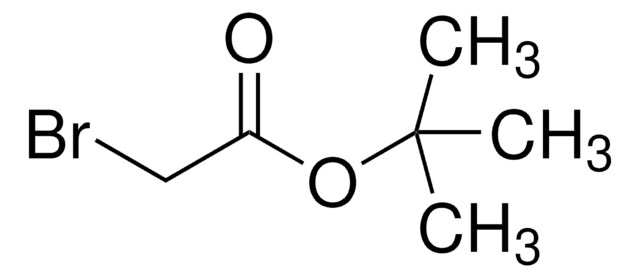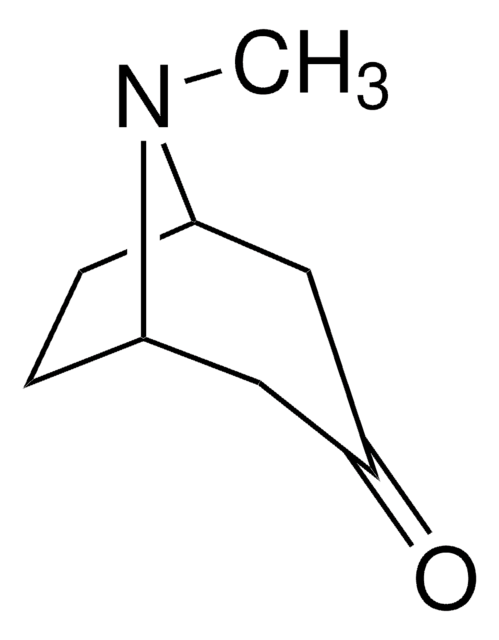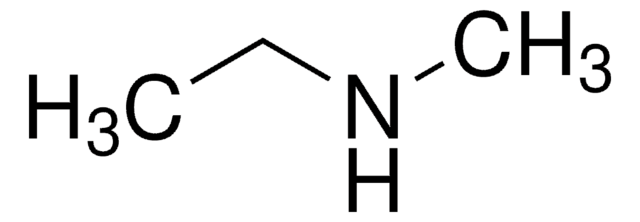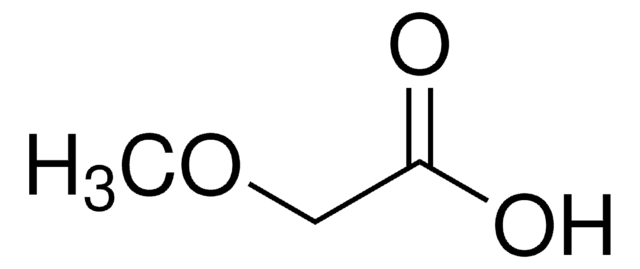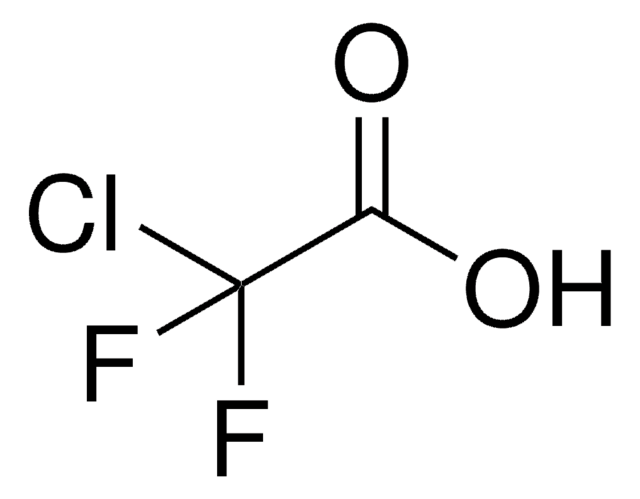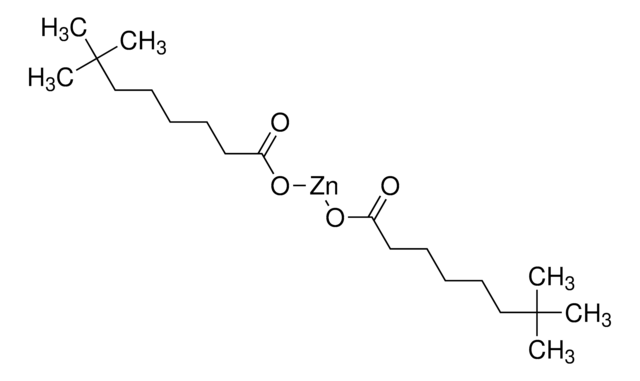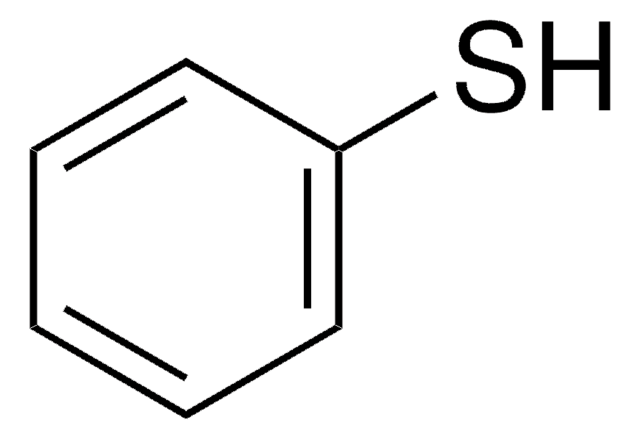439398
(4-Hydroxyphenoxy)acetic acid
98%
Iniciar sesiónpara Ver la Fijación de precios por contrato y de la organización
About This Item
Fórmula lineal:
HOC6H4OCH2CO2H
Número de CAS:
Peso molecular:
168.15
Número CE:
Número MDL:
Código UNSPSC:
12352100
ID de la sustancia en PubChem:
NACRES:
NA.22
Productos recomendados
Nivel de calidad
Ensayo
98%
mp
154-157 °C (lit.)
grupo funcional
carboxylic acid
cadena SMILES
OC(=O)COc1ccc(O)cc1
InChI
1S/C8H8O4/c9-6-1-3-7(4-2-6)12-5-8(10)11/h1-4,9H,5H2,(H,10,11)
Clave InChI
PKGWLCZTTHWKIZ-UHFFFAOYSA-N
Descripción general
(4-Hydroxyphenoxy)acetic acid along with formaldehyde ammonium salt forms a polyaromatic anionic compound RG-13577. RG-13577 mimics the synthetic heparin and specifically binds to the vascular smooth muscle cells (SMCs) and inhibits their proliferative growth. In the molecules of (4-hydroxyphenoxy)acetic acid, the carboxyl groups are held together by R22(8) hydrogen bonds.
Palabra de señalización
Warning
Frases de peligro
Consejos de prudencia
Clasificaciones de peligro
Eye Irrit. 2 - Skin Irrit. 2 - STOT SE 3
Órganos de actuación
Respiratory system
Código de clase de almacenamiento
11 - Combustible Solids
Clase de riesgo para el agua (WGK)
WGK 3
Punto de inflamabilidad (°F)
Not applicable
Punto de inflamabilidad (°C)
Not applicable
Equipo de protección personal
dust mask type N95 (US), Eyeshields, Gloves
Elija entre una de las versiones más recientes:
¿Ya tiene este producto?
Encuentre la documentación para los productos que ha comprado recientemente en la Biblioteca de documentos.
(4-Hydroxyphenoxy) acetic acid.
Byres M and Cox PJ.
Acta Crystallographica Section E, Structure Reports Online, 63(6), o2931-o2931 (2007)
Yun-Loung Lin et al.
Bioorganic & medicinal chemistry letters, 12(13), 1709-1713 (2002-06-18)
An epoxybenzoquinone, 4-hydroxyphenoxypropionic acid, and 2-hydroxy-3-phenyl-3-butenoic acid derivatives have been designed, synthesized, and evaluated for in vitro inhibition activity against 4-hydroxyphenylpyruvate dioxygenase (4-HPPD) from pig liver by the spectrophotometric enol-borate method. The biological data demonstrated that neither epoxybenzoquinone ester nor
M Benezra et al.
Journal of cellular biochemistry, 81(1), 114-127 (2001-02-17)
A synthetic heparin-mimicking polyaromatic anionic compound RG-13577 (polymer of 4-hydroxyphenoxy acetic acid and formaldehyde ammonium salt, Mr approximately 5800) exhibits specific binding to vascular smooth muscle cells (SMCs) and inhibits their proliferative response to growth promoting factors. Receptor binding of
B Palotás et al.
Analytical biochemistry, 179(2), 288-290 (1989-06-01)
A fast and sensitive spectrophotometric method has been developed to measure the level of hydroxylated by-products (p-hydroxyphenoxyacetic acid and p-hydroxypenicillin V) in penicillin V fermentations. The method is based on a color reaction of the above-mentioned phenolic by-products with nitrous
Choolakadavil Khalid Najeeb et al.
Colloids and surfaces. B, Biointerfaces, 102, 95-101 (2012-09-26)
Individual dispersion of single-walled carbon nanotubes (SWNTs) in biocompatible media is of particular interest for diverse biomedical and nanomedicine applications. Herein we present, for the first time, a neutral pH water-soluble chitosan derivative, chitosan-hydroxyphenyl acetamide (CHPA), prepared by functionalizing the
Nuestro equipo de científicos tiene experiencia en todas las áreas de investigación: Ciencias de la vida, Ciencia de los materiales, Síntesis química, Cromatografía, Analítica y muchas otras.
Póngase en contacto con el Servicio técnico